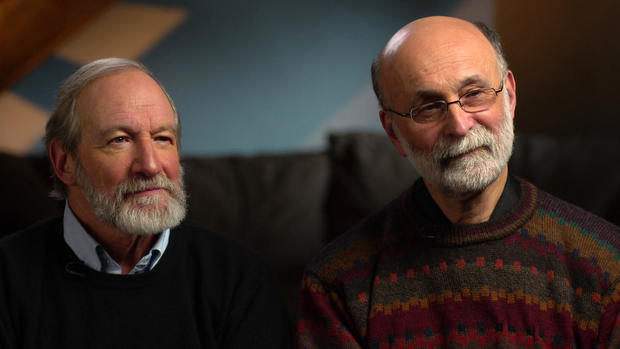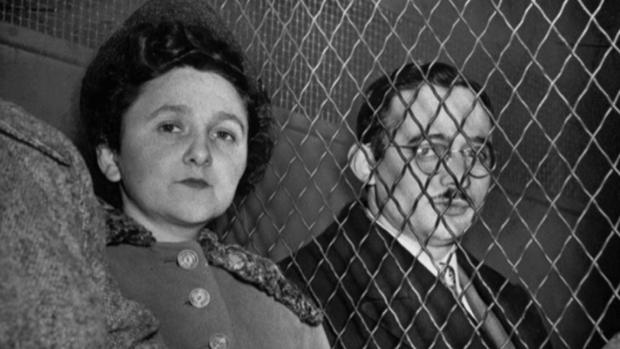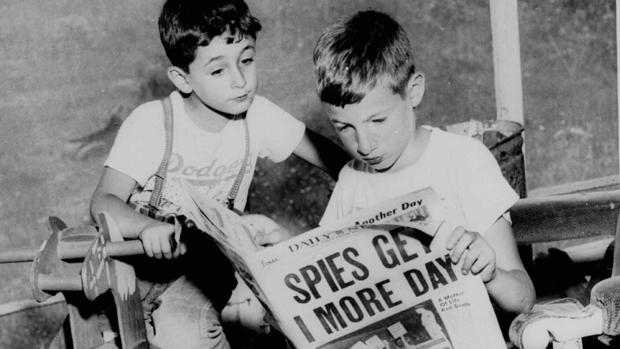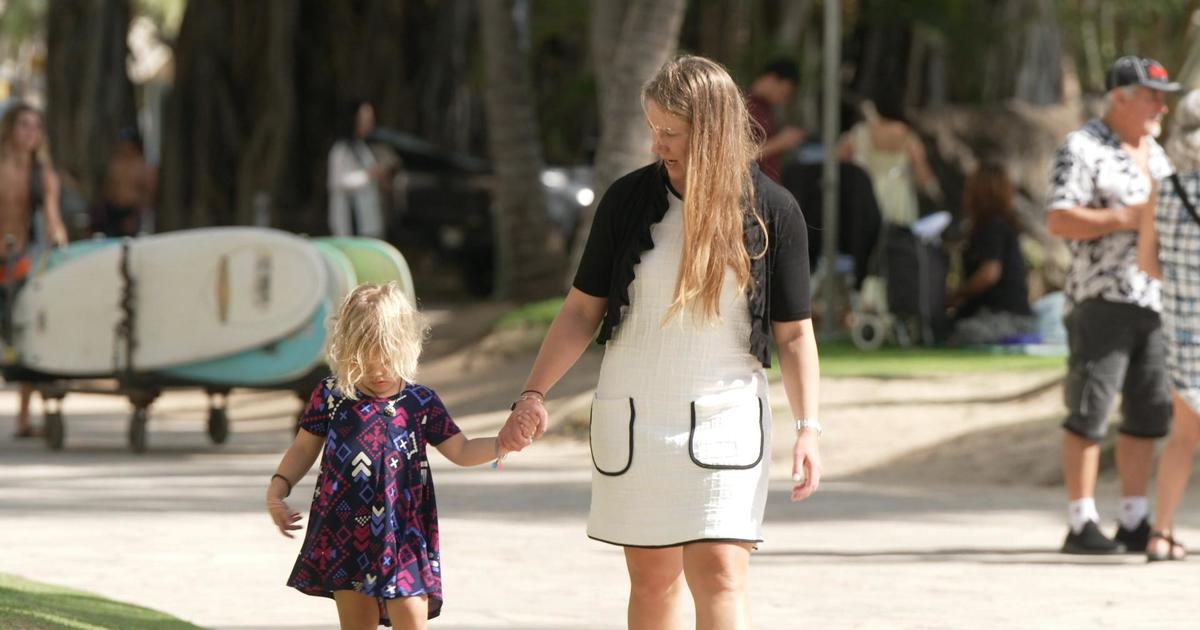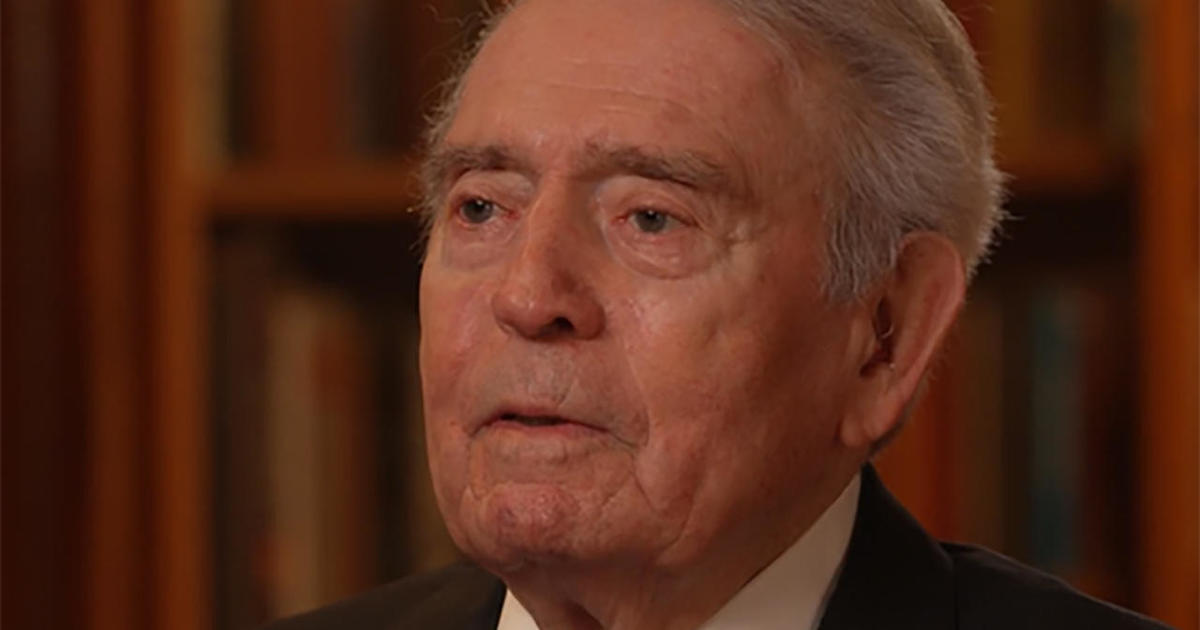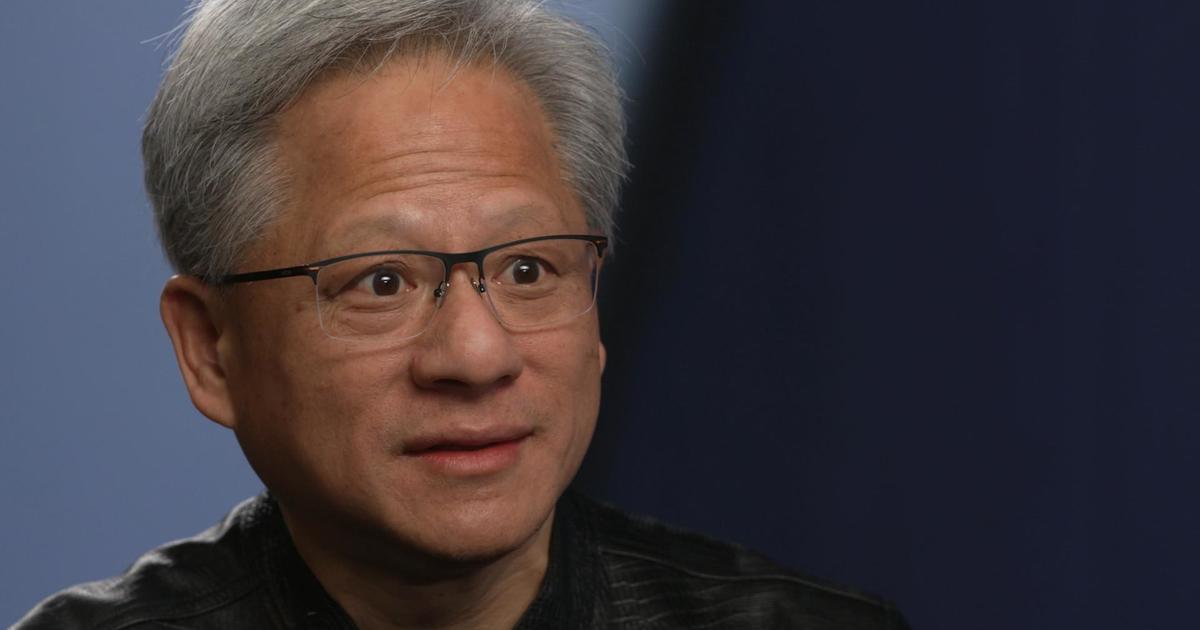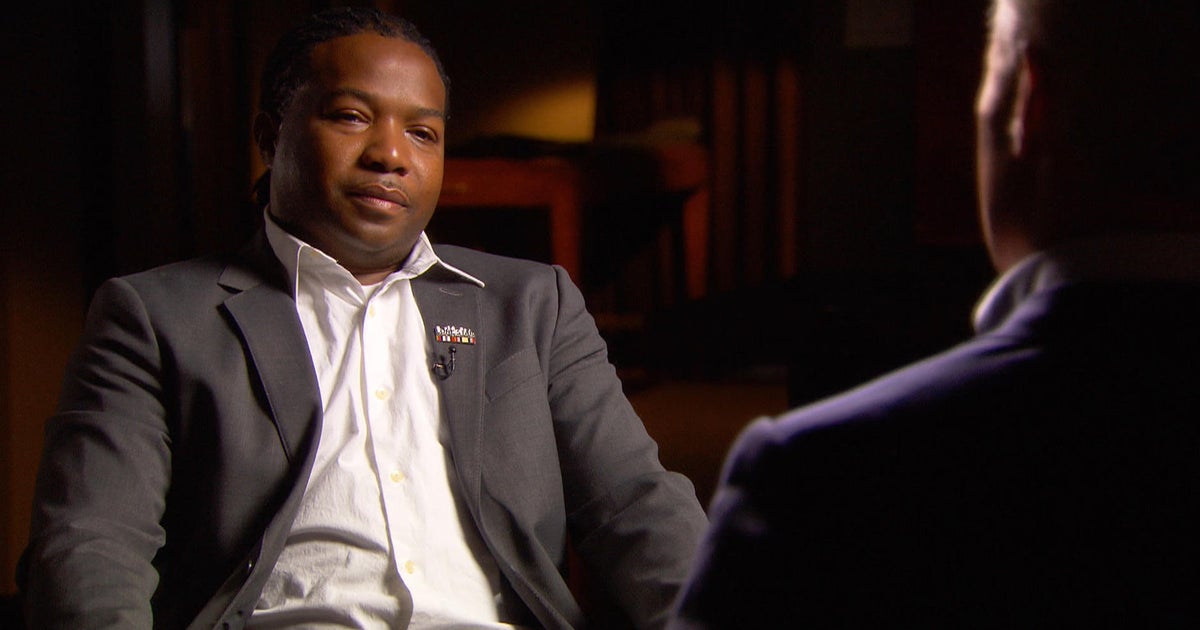Sons of Cold War spies reinvestigate their parents' case
It was called "The Crime of the Century," one of the most famous espionage cases of the Cold War. In 1953, Julius and Ethel Rosenberg were sent to the electric chair for conspiring to provide the secrets of the atomic bomb to the Soviet Union. They left behind two little boys, Robert and Michael, just 6 and 10 years old at the time.
The brothers Rosenberg were the orphans of Communist spies at the height of the McCarthy era. Relatives were afraid to take them in. One town blocked them from attending its schools. What ever happened to those two little boys? It's a remarkable story, a piece of American history that hasn't been fully told.
Anderson Cooper: People would ask you?
Michael Meeropol: Oh yeah, "Are you related to those two spies?" "No." But I really hated myself.
"We were the children of Communist spies. Being the Rosenberg's children in 1950 was almost like being Osama bin Laden's kids here after 9/11."
Anderson Cooper: Hated yourself because you were—
Michael Meeropol: I was denying-- I was too scared to-- admit that my parents were my parents.
Robert Meeropol: We were the children of Communist spies. Being the Rosenberg's children in 1950 was almost like being Osama bin Laden's kids here after 9/11.
Today, they're known by their adopted names, Michael and Robert Meeropol, but in 1950, they were Michael and Robby Rosenberg, ages 7 and 3, living in New York City's Lower East Side, with their parents Julius and Ethel Rosenberg. The Rosenbergs were ardent Communists but Michael doesn't recall his parents ever using that word. Ethel was a stay-at-home mom who loved to sing. Julius – an engineer who ran a small machine shop. That's Michael on his shoulders.
Michael Meeropol: My father would take me to places like Prospect Park and, you know, get some peanuts and feed squirrels.
Anderson Cooper: What was he like?
Michael Meeropol: He was very energetic. He had a smile on his face a heck of a lot of times. And I remember traveling around with him. In fact, I rode on the subway with him so often that I kind of wondered, you know, when he was working.
Anderson Cooper: And your mom? What was she like?
Michael Meeropol: She was very affectionate. A lot of hugging and kissing. And I remember that she was often cooking. The thing I remember is just a normal life.
But then, in the summer of 1950, FBI agents began rounding up a network of alleged Communist spies. On July 17th, they knocked on the Rosenbergs' door.
Michael Meeropol: I'm listening to "The Lone Ranger." And the door opens. And there is all these people in the room, who, you know, I guess-- friends of daddy's. But then my mother yells, "I had-- I want a lawyer." And I knew something was weird. And then the radio's turned off. Well, I'm a brash 7-year-old and I turned it back on. Somebody turned it off again. After about three times, I gave up, 'cause, you know, the attention was on my father. And then he disappears. He's gone.
Julius was accused of running a spy ring that tried to help the Soviet Union make an atomic bomb. After he refused to talk to the FBI, Ethel was arrested too.
Michael Meeropol: All I remember is I'm on the phone with her. And she says, "I'm under arrest." And I say, "You can't come home?" She says, "No, I can't." And I don't remember anything else about the phone call, but the story is that I screamed and that it gave her nightmares for the rest of her life.
Anderson Cooper: That scream?
Michael Meeropol: Yeah. It tore her heart.
Their grandmother put them up for a few months, but Michael and Robby say she resented their presence. When other relatives refused to care for them, they were sent to a children's shelter in the Bronx.
Anderson Cooper: Why didn't other family members take you in?
Robert Meeropol: They were terrified. Like, for instance, my father's older sister wanted to take us in. But her husband owned a small grocery store. And he said, "If people find out I've taken in the children of the Rosenbergs-- they won't buy food from my store."
Anderson Cooper: So then you're sent, essentially, to an orphanage?
Michael Meeropol: Yeah.
Anderson Cooper: What was that like?
Michael Meeropol: I remember it as horrible. Like something out of Dickens. The staff was pretty free with the slaps and the abuse. I felt like I was in prison.
Anderson Cooper: You felt like you were in prison, as well, not just--
Michael Meeropol: Yeah. Oh, absolutely.
Anderson Cooper: --your parents?
Michael Meeropol: One week after I was there, I remember crying to anybody I would talk-- I said, "I've been here a week. Don't you think they could let me go home now?"
The chief witness against their parents was their uncle, David Greenglass, who'd worked at the military's atomic bomb-making plant in Los Alamos, New Mexico. In March 1951, Greenglass testified he'd given sketches of the atomic bomb to Julius Rosenberg, and that Ethel had typed up his handwritten notes. David Greenglass's wife Ruth told the same story under oath. It took the jury only eight hours to reach a verdict.
[NEWSREEL: Headline: Death to A-Spies. Rosenbergs Get Top Penalty In Atom Trial: One of the greatest peacetime spy dramas in the nation's history reaches its climax.]
The judge sentenced the Rosenbergs to death, saying he considered their crime worse than murder, because he believed they'd put the atomic bomb in Soviet hands earlier than anyone had expected. While their lawyers appealed the decision, the Rosenbergs were taken to New York's Sing-Sing prison to await execution. Robby and Michael, now 4 and 8 years old, hadn't seen their parents for a year, but they were allowed to visit them at Sing-Sing.
Anderson Cooper: I heard that you asked to see the electric chair?
Michael Meeropol: Yep. The very first visit I said to a guard, "Let me see the electric chair."
Anderson Cooper: Why did you want to see the electric chair?
Michael Meeropol: I didn't want to see the electric chair. I wanted to prove to the people at the prison I wasn't afraid of it.
Robert Meeropol: I remember that the prison seemed like a big fortress that we were entering, this gray stone building, almost medieval like. But when we went into the visiting room, everything was kind of quiet and calm, which is what I needed. And I think that's because my parents made a conscious effort, to try to act that way. And so you could say that they fooled me. And I wanted to be fooled.
Michael Meeropol: I remember asking them both in Sing-Sing if they were innocent. I said, "Are you really innocent?" And they reacted, "But of course we are," you know? And that was enough for me for, you know decades.
But it wasn't enough for the Supreme Court, which denied the Rosenbergs' appeal. Never before in the U.S. had a husband and wife been sentenced to the electric chair, which would make their children orphans. The Rosenbergs' supporters held protests all over the world, arguing the couple was innocent and the sentence unjust. Albert Einstein, Pablo Picasso, and the pope appealed for clemency. Days before the scheduled execution, Michael and Robby joined demonstrators in Washington, D.C., and hand-delivered a plea for mercy to the White House. But President Eisenhower refused to intervene. On June 16th, 1953, -- nearly three years after their parents had been arrested -- the boys visited them at Sing-Sing for the last time.
Michael Meeropol: And as I was leaving, I started to wail, "One more day to live. One more day to live."
Anderson Cooper: You actually said that--
Michael Meeropol: Oh yeah, absolutely. It was terrible, you know? But it was-- it was honest. I mean basically, I was pissed off, because they were kissing us goodbye like, "See you next time." And I thought, you know, "They-- they should take-- make th-- a more big deal about this. 'Cause this could be forever."
The attorney general said the couple could still save themselves by providing information to investigators. But Julius and Ethel Rosenberg remained united in silence. As the hours of execution approached, reporters converged on the prison, and protestors gathered near New York's Union Square. Robby and Michael, now 6 and 10 years old, stayed at the home of a family friend in New Jersey, playing baseball and hoping for a last minute reprieve, which never came.
Michael Meeropol: I played catch 'till it was too dark to see the ball. And when I came in, I asked the adults what happened. And they wouldn't tell me. They just said, "We listened to every radio station. They all said the same thing." And so I knew. I got hugged by the woman who we were staying with. And she said, "You'll stay with us." And I said, "Yeah, I guess I will." And-- they said, "Let's keep it from Robby." And so I kept it from him for a week.
Anderson Cooper: For a week?
Michael Meeropol: Yeah. Well, I couldn't, I just couldn't-- for what reason or another, I just couldn't go on with the charade.
Anderson Cooper: Do you remember exactly what you said?
Michael Meeropol: Yeah. 'Cause he was talking about, "When Mommy and Daddy come home." And I said, "Oh, come on, let's tell him….Rob, Robby…"-- he was always Robby --"Mommy and Daddy aren't coming home. They're dead."
Anderson Cooper: Do you remember what he said?
Michael Meeropol: He acted as if he didn't understand.
Robert Meeropol: I think I've had to work my entire life at reacting to bad news, 'cause my first tendency whenever bad news comes is to pretend like it's not that bad somehow. And, you know, if you can do that with your parents being executed, you can do that with almost anything.
The Rosenberg's supporters viewed them as martyrs persecuted for their Communist belief. But to the vast majority of Americans, Julius and Ethel Rosenberg were atomic spies and traitors. Many believed they deserved to die.
Michael Meeropol: When my parents were killed, an-- a postcard came to the place I was staying. And it said, "Of course you feel for the loss of your parents, but when you think of all the boys they killed in Korea, you must realize that justice was done. Why don't you change your names and become Christians?"
Anderson Cooper: And you remember the words to this day?
Michael Meeropol: Well, those are the kind of words that you don't forget.
Anderson Cooper: In so many of the photos of you both at that time, your brother is-- his arm is around you or both arms are around you like he's protecting you.
Robert Meeropol: He was my anchor, you know, rather than sibling rivalry, it was more of, like, the two of us against the world.
Anderson Cooper: Who do you think this was harder on? You or Robby?
Michael Meeropol: I think it probably was much harder on Robby, because three years with my parents, what are his memories? He has very little to grab onto.
Robert Meeropol: I think it was harder on him. I think he had a tremendous sense of responsibility for me. And he understood more.
It had been quite a while since anything good had happened to the Rosbenberg boys. But in 1953, not long after their parents' funeral, they were introduced to Anne and Abel Meeropol, teachers who were supporters of the Rosenbergs. They took Michael and Robby into their home and eventually adopted them.
[Dictaphone recording: Introducing the Meeropol family….Robby Meeropol and yours truly! [singing] This land is your land, this land is my land…]
Anderson Cooper: The Meeropols became your parents?
Michael Meeropol: Absolutely. Totally.
Anderson Cooper: They changed your life?
Michael Meeropol: Yeah. They saved our lives.
Robert Meeropol: Within a few months of living with them, I was calling them Mommy and Daddy.
Anderson Cooper: Was it your choice to take their name?
Robert Meeropol: Well, I was too young to really have a choice. But it made us more anonymous. And that was a good thing.
As Michael and Robby Meeropol, they eventually went to college, got married, and started raising families of their own.
Robert Meeropol: I think it's no accident that both of us got married when we were young. That we both had two kids, just like we were two kids. As early as we could, we recreated the family that was torn apart.
Michael Meeropol became an economics professor. Robert, a lawyer and founder of a charity called the Rosenberg Fund for Children. They lived relatively normal lives. But for many years, most of the people they interacted with each day had no idea they were the children of Julius and Ethel Rosenberg.
Robert Meeropol: Essentially, I was in the closet from when I was 6 until when I was 20 with everybody who didn't already know.
Anderson Cooper: You were worried about letting the world know who you were?
Robert Meeropol: Yeah, I was, because whenever-- when the world knew who I was, it was very bad. Terrible things happened.
More than 20 years after their parents' execution, the brothers decided to step back into the limelight and reinvestigate the Rosenberg case. What they discovered when we come back.
Before Julius and Ethel Rosenberg were executed for conspiring to provide atomic secrets to the Soviet Union, Ethel wrote a letter to their sons Michael and Robby saying, "always remember that we were innocent." So perhaps it's not surprising that when the boys grew up, they wanted to try to clear their parents' names. What is surprising is how much new information they and independent historians have been able to uncover over the years -- secret messages, intercepted cables, long-forgotten files from the archives of the FBI, the CIA, and the KGB. The new information has changed the way this chapter of American history is viewed and, last year, the brothers asked President Obama to exonerate their mother.
The little boys who disappeared from public view after their parents were executed in 1953, re-emerged as grown men in 1975 determined to uncover new information in their parents case. They sued the FBI and the CIA under the Freedom of Information Act, seeking full access to the government's files on Julius and Ethel Rosenberg.
[Robert Meeropol at press conference: The government files represent the largest body of primary evidence on my parents' case in existence. We are not afraid of what is in them. Why is the government afraid? What are they trying to cover up?]
Anderson Cooper: Did you think you might be able to prove your parents' innocence?
Michael Meeropol: Oh, absolutely. I was absolutely convinced that we would find virtual proof.
Anderson Cooper: You were sure they were innocent?
Robert Meeropol: As sure as one-and-one equal two.
They formed a committee to re-examine the Rosenberg case. Ron Radosh was among the first to sign up. At the time, he was an author and activist, highly sympathetic to the Rosenbergs' cause and eager to help.
Ron Radosh: By then I had a phD in history and I believed, my expertise as a historian enabled me to want to go through all these files that I expected would prove their innocence.
But once Ron Radosh started going through the FBI files, he realized he was wrong: Julius Rosenberg had been a Soviet spy -- and a zealous recruiter of others.
Ron Radosh: I was stunned. It became readily apparent, that this was not people who were arrested because they opposed the Korean War or whatever, because they wanted peace.
Anderson Cooper: Essentially--
Ron Radosh: So--
Anderson Cooper: --Julius Rosenberg's job was as a recruiter of others? He was--
Ron Radosh: Right, he--
Anderson Cooper: --developing a network--
Ron Radosh: --ran a network. He put it together and handled them all.
In 1983, Ron Radosh co-wrote a book outlining the new evidence that Julius Rosenberg was guilty.
Anderson Cooper: How did the Meeropols and others on the left respond?
Ron Radosh: Horrendously. I mean, I was ostracized, attacked.
Anderson Cooper: People stopped speaking to you?
Ron Radosh: Yeah. I had phone calls in the middle of the night, death threats, the usual thing. I mean-- and we lost-- actually lost good friends, very good friends. Who no longer stopped talking to us, and to this day.
Anderson Cooper: To this day?
Ron Radosh: Oh, absolutely.
It took Michael and Robby a long time to accept that their father was guilty. They finally acknowledged it in 2008, when their parents' co-defendant Morty Sobell admitted for the first time he had been part of Julius Rosenberg's spy ring.
Anderson Cooper: Was there any part of you that was disappointed in your father?
Michael Meeropol: No. No. Not at all.
Anderson Cooper: Not disappointed that he actually did commit espionage?
Michael Meeropol: I'll speak for myself. No, I-- I didn't.
Robert Meeropol: You know, for years we were saying our parents were innocent lambs brought to slaughter. And to come to the realization that, instead, they were knowing political actors who made decisions based upon their beliefs, I actually found that to be more palatable. I didn't want them to just be victims.
Anderson Cooper: But your father was breaking U.S. law--
Michael Meeropol: Absolutely.
Anderson Cooper: --to do this. So--
Michael Meeropol: Yeah, he was.
Robert Meeropol: And I think that if he'd been arrested and given a five or 10-year prison sentence, we would have nothing to complain about.
There's now plenty of evidence that Julius Rosenberg's spy network stole important technology for jet fighters, radar, and detonators. But the one thing he and his spies didn't do a very good job of stealing was atomic secrets – the heart of the prosecutors' case. Most historians agree that the Soviets got the most important atomic bomb-making information from Los Alamos scientists Klaus Fuchs and Theodore Hall, who belonged to a different Russian spy ring.
The Los Alamos informant Julius was accused of recruiting, Ethel's brother David Greenglass, was a machinist, not a scientist. When a copy of the sketch Greenglass said he drew for the Soviets was made public in 1966, nuclear scientists were not impressed.
Michael Meeropol: 1966, top scientists look at it, and they make it clear that this thing is a secret of nothing. It's got no dimensions in it. It's got errors in it.
Newspapers called Julius and Ethel Rosenberg "atomic spies" and the judge sentenced them to death for putting the atomic bomb in the hands of the Soviet Union. But there's ample evidence the U.S. government knew at the time that the information David Greenglass gave to the Soviets was of minor value.
Anderson Cooper: The prosecutors knew the information the Rosenbergs had access to was not the-- the crown jewels of the atomic world?
Ron Radosh: Yes. But they were pushing for a prosecution without using the hardest evidence they could-- they had. Couldn't be used.
That's because in the 1940s the U.S. government had been secretly intercepting Soviet messages, and it didn't want the Soviets to know it had broken their code. So instead, prosecutors pressured David Greenglass and his wife Ruth, to testify against Julius and Ethel Rosenberg. Michael and Robby argue that prosecutors framed their mother by inventing evidence that she typed up David Greenglass' notes on the atomic bomb.
[Greenglass: Where do I sit? Right there?]
[Voice [off camera]: Yes, sir.]
In 2001, half a century after he testified that his sister typed up his notes, David Greenglass told 60 Minutes correspondent Bob Simon it was a lie.
Bob Simon: So Ethel finally went to the electric chair on the basis of evidence that was false.
David Greenglass: False.
He said he did it to save himself and his wife, and he showed little remorse.
David Greenglass: We're still here. I didn't have to go away, nobody killed me and I survived.
Bob Simon: Your sister didn't.
David Greenglass: You know, I'd like to say something: I would not sacrifice my wife and my children for my sister. How do you like that? My wife is more important to me than my sister.
Greenglass said he was pressed to give this false testimony by one of the prosecutors in the case, Roy Cohn, who would go on to become Senator Joseph McCarthy's right-hand man and was later disbarred for unethical conduct.
Bob Simon: Did Cohn encourage you to testify that you saw Ethel typing up the notes?
David Greenglass: Of course, he did.
As a reward for their testimony against the Rosenbergs, David Greenglass got a reduced sentence and his wife Ruth, who had served as a Soviet courrier, never spent a day in prison. Prosecutors believed the prospect of Ethel dying in the electric chair, would force Julius Rosenberg to confess and name other Soviet spies.
Michael Meeropol: In the case of my mother, she really is collateral damage, you know, this is -- this is the government trying…putting a gun to her head and saying to Julie "Talk or we'll kill her."
Anderson Cooper: You don't think she was involved at all?
Michael Meeropol: We don't believe that, and in fact we believe that the evidence has virtually proved that.
After David and Ruth Greenglass died, their testimony to a grand jury before the Rosenberg's trial was unsealed. There was no mention of Ethel Rosenberg typing up David Greenglass' notes and when those Soviet messages the U.S. had been secretly decoding were publicly released, they showed the Soviets had never given Ethel Rosenberg a code name. In 1997, when Julius Rosenberg's former Soviet handler Alexander Feklisov went public with tales of Julius' spy missions for the Soviet Union, Feklisov had this to say about Ethel Rosenberg:
Alexander Feklisov: Ethel never worked for us. She didn't do anything.
Based on this information, Robert and Michael Meeropol launched a campaign to clear their mother's name. In 2015, they got 13 members of the New York City Council to issue a proclamation declaring the government wrongfully executed Ethel Rosenberg.
Robert Meeropol: It is time for the federal government to step up and do the same.
Last year, they've launched an online petition drive, callling on President Obama to exonerate their mother before he leaves office. But historian Ron Radosh says, based on the documents he's seen, that would be a mistake.
Ron Radosh: She was an accessory to spying by helping, identifying people, urging people to be recruited, suggesting that her own brother be recruited, this is aiding those who are spying. It's aiding and abetting.
Anderson Cooper: You're saying even though she wasn't as involved as her husband, she still engaged in a conspiracy--
Ron Radosh: Yes. She considered herself a friend of the Soviet Union, was doing-- helping her husband in his valuable work.
Anderson Cooper: So the trial was not fair, but that doesn't mean the Rosenbergs were innocent--
Ron Radosh: Right. Right. You could say-- if you want to say those who say the Rosenbergs were framed, they framed guilty people.
Anderson Cooper: But you are acknowledging there was an injustice when it comes to Ethel in terms of the death penalty?
Ron Radosh: Yes. Yeah. Sh-- compared to the others, she was of minimal importance. She should not have been executed. The government did it as a mechanism of leverage, hoping that would push Julius to talk. It didn't work. And I think they were shocked that it didn't work. I th-- they all thought Julius would break and cooperate.
Anderson Cooper: When Judge Kaufman sentenced them to death, he said the Rosenbergs loved their cause more than their children. Do you think that's true?
Ron Radosh: Yes. Unfortunately, I would agree with that. Yes. Otherwise, how could they have done what they did?
Anderson Cooper: You've said that your mother was a hostage who was killed when your father wouldn't talk. Isn't it true though that she could have told investigators everything she knew and lived?
Robert Meeropol: Both our parents could've saved themselves.
Michael Meeropol: No question--
Robert Meeropol: The F.B.I. agents who've written memoires in which they said, "We didn't want them to die. We wanted them to talk."
Anderson Cooper: After your father had been executed, could she have then--
Michael Meeropol: Absolutely.
Anderson Cooper: --last minute--
Michael Meeropol: Exac--
Anderson Cooper: --said, "You know what? I'll tell you everything I know"?
Michael Meeropol: Absolutely. In fact, we know that the rabbi came to her cell after witnessing our father's execution and said, "Julius is gone and, you know, you have two children. And if there's anything you can say, a name, even a false name, just anything, you know, to save yourself." And allegedly, she said to the rabbi, "I have no names. I'm innocent and I'm ready."
Robert Meeropol: Ultimately, they couldn't betray each other. They couldn't and they would not betray each other. And that would've been the ultimate betrayal.
"...the fact that the government facilitated the invention of evidence in order to convict someone of a capital crime, that is something that should concern everybody."
Anderson Cooper: Do you feel she betrayed you?
Robert Meeropol: N-- not at all.
Anderson Cooper: The judge said, "Your parents loved their cause more than their own children," which is certainly a very cruel thing to say--
Robert Meeropol: And it's not true.
Anderson Cooper: You don't believe by--
Robert Meeropol: I don't--
Anderson Cooper: --by choosing to die rather than cooperate, they didn't prove the judge right?
Robert Meeropol: No, I don't think they did. If you were interviewing us in a psychiatric ward-- then you might say, "Yeah-- they-- they damaged us by what they did."
Anderson Cooper: To you exoneration would mean what? Is it political or is it personal?
Michael Meeropol: Both.
Robert Meeropol: Oh, it's both. Our mother was killed for something she did not do. She was taken away from us. That's as personal as it can get. But, the fact that the government facilitated the invention of evidence in order to convict someone of a capital crime, that is something that should concern everybody.
Since our story first aired, more than 50,000 people signed an online petition calling for Ethel Rosenberg to be exonerated. In December, the brothers went to the gates of the White House to plead their case, just as they had done as boys. But President Obama never responded to their request, and the brothers told us they don't plan on asking President Trump.
Produced by Andy Court. Evie Salomon, associate producer.
